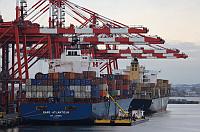
Photo:Librado Romero/The New York Times
Update: The port strike has been averted for now with a 30 day contract extension.
In early December we posted about the end of the eight day West Coast dock strike that shut down 10 of the port’s 14 container terminals in the port of Los Angeles/Long Beach, in one of the busiest traffic seasons of the year. Now the US is facing another dock strike, this time on the East and Gulf coasts, which could shut down 15 ports from Massachusetts to Texas. If an agreement is not reached between the International Longshoremen’s Association (ILA) and the ports by December 30th, the US could face its first coastwide strike since 1977.
While the media has focused on the upcoming “fiscal cliff,” the impact of tax and budget negotiations in Washington, the shutting down of containerized cargo on the East and Gulf coasts could be a “container cliff” with a major impact on the US economy.
Dockworkers Strike Threatens to Close East Coast Ports
The strike threat has so alarmed corporate America that more than 100 business groups wrote to President Obama last week to urge him to intervene to push the two sides to settle — and, if need be, to invoke his emergency powers under the 1947 Taft-Hartley Act to bar a strike. President George W. Bush invoked the act in 2002 to end a lockout at ports on the West Coast, where a different union represents dockworkers.
Despite their small numbers, the East Coast dockworkers have outsize influence. Many of them, like the crane operators who transfer containers from ships to the docks, are highly skilled and cannot be easily replaced. And because they control the loading and unloading of goods in most of the nation’s ports, a strike could cause extensive economic damage at a time when the economy is already weak.
“They’re in a crucial place in the flow of goods,” said Richard W. Hurd, an industrial relations professor at Cornell University.
The Port Authority of New York and New Jersey estimates that a strike would cost the region $136 million a week in personal income and $110 million in economic output.
